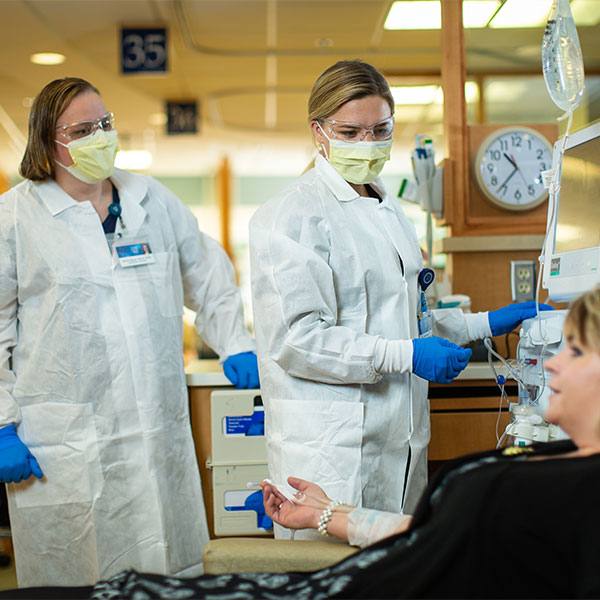-
Biotherapeutics
Science Saturday: Regenerative eyedrops tap blood for tears
Gregory Williams turned to regenerative medicine for healing after a one-two punch to his health. The 63-year-old Florida man survived leukemia only to develop ocular graft-versus-host disease, a potentially blinding complication of the bone marrow transplant that put his cancer in remission.
Ocular graft-versus-host disease is a chronic debilitating condition with no cure that causes severe dry eyes. The Regenerative Medicine Therapeutic Suites in Florida, recognizing an unmet patient need, began producing and offering a treatment known as autologous serum eyedrops to regenerate moisture. These eyedrops are made from a patient's own blood.
The Mayo Clinic Center for Regenerative Medicine has been a driver of advancing regenerative care, together with the Regenerative Medicine Therapeutic Suites, as a leader in outpatient regenerative procedures.
"Autologous serum eyedrops are considered a compound medication that is manufactured from serum extracted from a patient's own blood. The eyedrops utilize cells and growth factors to modify the ocular surface and restore the body's ability to produce natural tears," says Jennifer Arthurs, a nurse practitioner in the Regenerative Medicine Therapeutic Suites.
A day to remember
July 17, 2019, is a day Williams will never forget. He collapsed on the job and was rushed to Mayo Clinic, where he was diagnosed with leukemia. Williams fought the disease with grit and determination, emerging victorious after chemotherapy and a bone marrow transplant. However, the donor bone marrow cells started attacking his body, causing inflammation that resulted in ocular graft-versus-host disease, which can affect many organs ― in this case, his eyes.
Desperate for relief, Williams scanned the internet, connecting with patients worldwide for suggested treatments. He tried remedies like washing his eyes with warm water, but nothing seemed to work.
"It was bad. I could barely open my eyes. I told my doctor, 'I can't live like this.' I could hardly see. I couldn't drive a car. I couldn't even read," says Williams.
His ophthalmologist prescribed autologous serum eyedrops, but Williams could not find any pharmacies that were able to fill the prescription. Pharmacies that could were a long distance from his home.
"These drops are not made by most pharmacies. The challenge in manufacturing them lies in the fact that each prescription is made from the patient's own blood and must be prepared under stringent laboratory guidelines. It can take up to three hours per patient to produce the drops," says Cheryl Desmond, lead medical technologist at the Regenerative Medicine Therapeutic Suites. "We've developed a way to produce the drops in as little as three hours, but at other places, it often takes 24 hours or longer."
A new regenerative medicine service line
The Regenerative Medicine Therapeutic Suites developed a strategic collaboration with Mayo Clinic's Department of Ophthalmology to address the need for autologous serum eyedrops. Together, they were able to devise a way to manufacture the drops at point of care, within the Regenerative Medicine Therapeutic Suites, to meet strict quality control and regulatory guidelines. New services like this offer an example of how regenerative medicine augments standard of care practice to provide new solutions for unmet patient needs.
"The serum eyedrops considerably improve patients' ocular condition, which not only improves their sight, but also decreases their ocular irritation. The scratchy foreign body sensation and light sensitivity problems are greatly reduced after starting these drops," says Darby Miller, M.D., an ophthalmologist at Mayo Clinic in Florida. "If patients don't have access to this treatment, their ocular surface disease will worsen, which not only causes vision loss, but also chronic and constant irritation."
Dr. Miller writes the prescription for the eyedrops, and patients have their blood drawn at the Regenerative Medicine Therapeutic Suites. The eyedrops are manufactured as the patient is seen on-site. Data from the first six months of the service show 3,300 doses were dispensed, and patients who received them were highly satisfied.
"We use a patient-reported outcome tool called the Ocular Surface Disability Index that quantifies patient pain, function and quality of life into a single score. Overall, patients reported a 30% improvement in their dry eye symptoms. That is quite a profound improvement for a condition that often has no other treatment," says Shane Shapiro, M.D., medical director of the Regenerative Medicine Therapeutic Suites.
Pharmacies at Mayo Clinic in Arizona and Mayo Clinic in Rochester fill prescriptions for autologous serum eyedrops, but patients must have their blood drawn first and then transfer the blood to the pharmacy to have the eyedrops processed.
The autologous serum eyedrops manufactured within the Regenerative Medicine Therapeutic Suites are not covered by insurance. However, Williams says paying out of pocket is worth it for him.
"I got my life back. My eyes are 100% better," adds Williams.
Williams says now that he is not constantly battling dry eye disease, he has been able to get back to reading and driving a car. Most importantly, he has been able to go back to his job as a telecommunications specialist.
###












